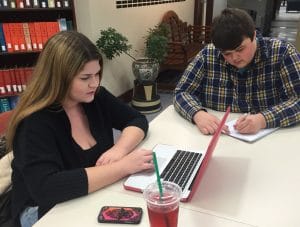By Ellena Sweet | Campus News Editor
Every Saturday morning at 5:30 a.m., Lily Jones drags herself out of bed to get ready for her weekend job at a local café. A junior at Salve Regina University, Jones also holds a part-time work-study position with the office of University Relations. Add that to an e-board position with the Mosaic student newspaper and her role as co-president of the film production club Salve Studios.
For the past month, Salve Studios has been working on its first big undertaking: a short horror film. As co-writer and co-director, Jones rises around 4:30 a.m. nearly every weekday morning to lead the film’s production team.
Jones is also enrolled in six upper level courses, and this semester marks the second time that she has opted to over enroll. As a member of Salve’s Pell Honors Program, Jones is entitled to nine free overload credits. Having transferred to Salve during the start of her sophomore year, Jones finds over loading particularly helpful as she works to replace credits that she lost during the transfer process.
However, this time around, Jones finds herself regretting her decision to overload, as it has become harder and harder to fit schoolwork in between clubs, filming and two part-time jobs. Often times, she’s forced to stay up late or rise early in order to keep up with her demanding workload, and doing so has taken its toll.
“I work myself so hard that I become overtired, and then I sleep through my alarm or forget to set my alarm, which is something I never do,” says Jones. “There have been several instances this semester where I woke up late and either didn’t get to finish my work on time, was late for an activity, or was late for work.”
Beyond sleep-deprivation, Jones has had to sacrifice many of the things that she enjoys most. “I don’t have the free time to go out on the weekends, I don’t have the free time to watch TV or to do things that I typically like to do,” she says.
Ultimately, Jones feels as if the caliber of her schoolwork has suffered the most. “It gets to a point where it becomes a battle of quantity versus quality, and I’m not giving the correct amount of attention to the things that I need to do,” says Jones.
Jones isn’t the only college student struggling to stay afloat in a seemingly endless pile of responsibilities. According to the U.S. Census Bureau, in 2014, nearly 44 percent of students at 4-year colleges held part-time jobs while in school.
Meanwhile, involvement in extracurricular activities has become the rule, not the exception. In Harvard Magazine’s article “Nonstop,” author Craig Lambert explains that extracurricular activities have become equally important to coursework, leading to seemingly nonstop schedules for today’s college students. According to Lambert, because of this, opportunities for deeper understanding are rapidly diminishing. “The paradox is that students now live in such a blur of activity that idle moments for such introspection are vanishing,” he says.
Dr. Matthew Ramsey, associate professor and chairman of the Department of English and Communications, agrees that a hectic lifestyle can prevent deeper engagement with course materials. “The busier students are, there’s no opportunity for really deep understanding,” he says. Dr. Ramsey also worries about the impact that an overactive lifestyle can have on students’ academic performance, as they are allowed less and less time to spend on their coursework.
As a professor and an advisor, Dr. Ramsey has noted that students seem busier than ever. Between classes and involvement in clubs, sports and work, he worries about students being able to juggle it all while maintaining a well-rounded college experience. “Part of the reason to go to college is to have fun,” he says. “Many students act like they already have a job. They’re treating life like they’re already employed, but there’s time for that later.”
According to Dr. Ramsey, there’s nothing good about being on the go all the time. “There’s value to having to get a certain amount of work done,” he says. “But being busy all the time, that’s just stress.”
Other professors argue that high levels of engagement are mostly beneficial. Dr. John Tawa, an assistant professor in the Department of Psychology, often finds himself encouraging students to get more involved both on and off campus. According to Tawa, when it comes to the benefits of being busy, the proof is in the research. “One of the things that we do find is that students do better academically when they have some club or extracurricular involvement,” he says.
Dr. Tawa attributes this correlation to the structure that extracurricular activities can provide for students who are learning how to live and learn independently. “What it does for many people is that it provides a level of structure that students don’t have when they start college,” he says. “You have to self motivate more, and that can actually be really hard.”
In terms of the stress associated with an over-active lifestyle, Dr. Tawa also cites benefits. In healthy ranges, stress can serve to motivate students and, as Tawa argues, humans need at least some stress to remain productive. “Stress is an interesting function for people,” he says. “People who show low levels of stress and anxiety don’t actually perform that well. The peak performance is always at mid levels of stress and anxiety.”
Still, he admits that everyone has their breaking point, as high levels of stress can become crippling for students. “What you see is, when somebody hits that threshold, it starts affecting everything they’re involved in because their cup is just full,” he says.
Last year, junior Marrissa Ballard learned this lesson the hard way after overloading on courses two semesters in a row. “I remember every night I would enter this kind of space where I would feel really stressed out and I wouldn’t want to do my work, so I’d procrastinate,” she says. “Then I’d have this inner dialogue about what I should be doing and it would make me feel bad.” She recalls paper writing being especially painstaking. “Each word was like pulling a tooth out,” she says.
By the end of last year, Ballard had decided to over enroll for a third time, but she experienced a change of heart over the course of the summer. “I would have a pit in my stomach every time I thought of the upcoming semester,” she says. Ultimately, she decided to cut back by dropping her sixth course.
Today, Ballard remains highly involved on campus. She works in Salve’s writing center and is currently part of the University Writing Partner Program. She’s also auditing a class in addition to the five courses that she’s enrolled in. For extracurricular work, she acts as Managing Editor for Mosaic student newspaper, Treasurer for The Willow Literary Magazine, and Secretary for Salve’s Film Club. She’s also a member of the University Choir.
“To be honest, I don’t do anything but homework,” she says. “I do homework, and then I eat and then I sleep. I don’t do anything for fun or to relax. You kind of have to make a decision between being healthy and getting your work done.”
For Ballard, the prospect of graduating and having a regular work schedule is what keeps her going. In the mean time, she hopes that all of this hard work will help her get there. “I’m really hoping that me trying so hard in college is going to pay off when I get out into the real world.”
Like Ballard, Lily Jones is hopeful that being so busy in college will be worth it in the end. “I just hope that one thing that I’ve accomplished will help me after the fact,” she says. “But, I have no way of knowing that until I actually get out there.”














